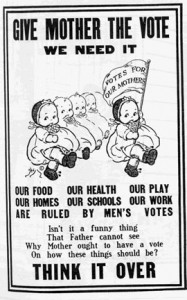 Women are natural communicators. No one doubts this, really, and a quick, unscientific glance at the blogosphere confirms the female desire to enter into the conversation about important issues impacting our world. But why are so many of these bubbling female voices still running underground, or being siphoned off into their own little “women’s quarters” of Christian society?
Women are natural communicators. No one doubts this, really, and a quick, unscientific glance at the blogosphere confirms the female desire to enter into the conversation about important issues impacting our world. But why are so many of these bubbling female voices still running underground, or being siphoned off into their own little “women’s quarters” of Christian society?
For instance, I watched “Lord, Save Us From Your Followers” on Saturday. It was a funny, compassionate movie that all Christians would do well to watch. But the next morning, it struck me: while several women were interviewed for the film, none of the Christian leaders, the ones who spoke more or less on behalf of the establishment (for better or for worse), were female. Even among people who are working hard for a more just society, who are talking about things like compassion and reconciliation and listening to others, the female voice was strikingly absent, or at least lopsided in the way it was presented.
I’m sure this was a simple oversight, but it’s an oversight that plays out time and time again. Too often, the established power structures don’t even think to ask for a female perspective, to seek out a healthy counter-balance in areas that have traditionally been the domain of men. And that’s too bad. Because when the feminine voice is muted, intentionally or unintentionally, we miss out on a lot of what God is trying to communicate to the world through his female image-bearers.
This is one of those areas that the Christian community is going to have to be very, very intentional about changing. (Sharon Hodde Miller, who is currently pursuing her PhD in Educational Studies at Trinity Evangelical Divinity School, had some great thoughts about this on her blog.) Most women, especially Christian women, were raised to avoid being “pushy.” (The double-standard between “pushy” women and men who “take initiative” is a post for another day.) And men–well, men are just used to being the only people in the board room. That’s the way it’s always been, and they don’t know what they’re missing out on. What we’re all missing out on.
“It is not good for man to be alone,” and I believe that holds true for every aspect of human existence, not just our personal relationships. Women have an incredible wealth of wisdom, insight, and parallel perspectives to offer the world. There are treasures to be mined in Scripture that female eyes can spot much more readily than male’s, deep, untapped veins of gold still waiting to be unearthed. There are solutions apparent to third-world mothers that male heads of state would never think of. A healthy shot in the arm of female influence would inoculate our world against a whole host of devastating social diseases.
Did you know, for instance, that maternal and child death in the United States dropped sharply as soon as women got the vote? During World War I, more American women died in childbirth than American men died on the battlefield. Still, the male legislators didn’t see it as an important issue, until the suffragists made it one. In 1921, the suffragists pushed through the Sheppard-Towner act, and almost overnight, infant and maternal death rates dropped 16% and 12% respectively. By the time those babies were having babies of their own, maternal fatalities were down over 70%, primarily because of women’s ability to influence public policy.
Men and women need each other, and not just to create babies. We need each other to create the world God had in mind when he put us here, male and female, and told us to take dominion. To multiply disciples who will bear God’s image to the world. Imagine Barak without Deborah. Josiah without Huldah. David without Abigail. Apollos without Priscilla. Each man was willing to quiet his strong, powerful voice so he could listen closely to the softer voice of his female counterpart. Each was immeasurably better for it, as was society.
What do you think? How have you seen this play out? And how can men and women work together to create a better world, one more aligned with God’s kingdom purposes?

15 Responses to Making Space for the Feminine Voice